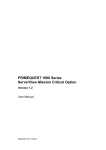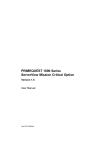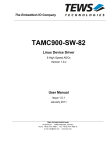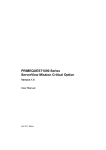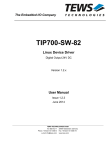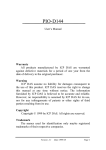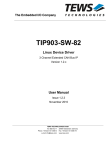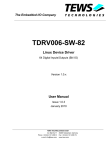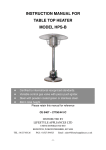Download TIP610-SW-82 - powerbridge.de
Transcript
The Embedded I/O Company TIP610-SW-82 Linux Device Driver Digital I/O Version 1.1.x User Manual Issue 1.2 February 2004 TEWS TECHNOLOGIES GmbH Am Bahnhof 7 Phone: +49-(0)4101-4058-0 e-mail: [email protected] 25469 Halstenbek / Germany Fax: +49-(0)4101-4058-19 www.tews.com TEWS TECHNOLOGIES LLC 1 E. Liberty Street, Sixth Floor Phone: +1 (775) 686 6077 e-mail: [email protected] Reno, Nevada 89504 / USA Fax: +1 (775) 686 6024 www.tews.com TIP610-SW-82 This document contains information, which is proprietary to TEWS TECHNOLOGIES GmbH. Any reproduction without written permission is forbidden. Digital I/O Linux Device Driver TEWS TECHNOLOGIES GmbH has made any effort to ensure that this manual is accurate and complete. However TEWS TECHNOLOGIES GmbH reserves the right to change the product described in this document at any time without notice. TEWS TECHNOLOGIES GmbH is not liable for any damage arising out of the application or use of the device described herein. 2004 by TEWS TECHNOLOGIES GmbH Issue Description Date 1.0 First Issue July 20, 2001 1.1 Changes for driver installation August 23, 2001 1.2 Support for IPAC CARRIER DRIVER, DEVFS and SMP February 10, 2004 TIP610-SW-82 - Linux Device Driver Page 2 of 28 Table of Contents 1 2 INTRODUCTION......................................................................................................... 4 INSTALLATION.......................................................................................................... 5 2.1 2.2 2.3 2.4 2.5 3 DEVICE INPUT/OUTPUT FUNCTIONS ..................................................................... 8 3.1 3.2 3.3 3.4 3.5 4 Build and install the device driver.................................................................................................5 Uninstall the device driver .............................................................................................................5 Install device driver into the running kernel ................................................................................6 Remove device driver from the running kernel ...........................................................................6 Change Major Device Number .......................................................................................................7 open() ...............................................................................................................................................8 close().............................................................................................................................................10 read() ..............................................................................................................................................11 write() .............................................................................................................................................13 ioctl() ..............................................................................................................................................15 3.5.1 T610_IOCG_READ_DIR....................................................................................................17 3.5.2 T610_IOCS_WRITE_DIR ..................................................................................................19 3.5.3 T610_IOCG_READ_POL...................................................................................................21 3.5.4 T610_IOCS_WRITE_POL .................................................................................................23 3.5.5 T610_IOCX_EVENT_READ ..............................................................................................25 DEBUGGING ............................................................................................................ 28 TIP610-SW-82 - Linux Device Driver Page 3 of 28 1 Introduction The TIP610-SW-82 Linux device driver allows the operation of a TIP610 IPAC module on Linux operating systems with kernel version 2.4.4 or higher installed. Because the TIP610 device driver is stacked on the TEWS TECHNOLOGIES IPAC carrier driver, it’s necessary to install also the appropriate IPAC carrier driver. Please refer to the IPAC carrier driver user manual for further information. The TIP610 device driver includes the following features: ! ! ! ! ! reading the actual port values writing new port values configure port directions configure port polarity wait for selectable input events (match, high-, low-, any-transition on the input line(s) of port A and port B) TIP610-SW-82 - Linux Device Driver Page 4 of 28 2 Installation The software is delivered on a PC formatted 3½" HD diskette. The directory A:\TIP610-SW-82 contains the following files: TIP610-SW-82.pdf TIP610-SW-82.tar.gz This manual in PDF format GZIP compressed archive with driver source code The GZIP compressed archive TIP610-SW-82.tar.gz contains the following files and directories: tip610/tip610drv.c tip610/tip610def.h tip610/tip610.h tip610/makenode tip610/makefile tip610/example/example.c tip610/example/makefile Driver source code Driver include file Driver include file for application program Script to create device nodes on the file system Device driver make file Example application Example application make file In order to perform an installation, extract all files of the archive TIP610-SW-82.tar.gz to the desired target directory. Before building a new device driver, the TEWS TECHNOLOGIES IPAC carrier driver must be installed properly, because this driver includes the header file ipac_carrier.h, which is part of the IPAC carrier driver distribution. Please refer to the IPAC carrier driver user manual in the directory path A:\CARRIER-SW-82 on the distribution diskette. 2.1 Build and install the device driver • Login as root • Change to the target directory • To create and install the driver in the module directory /lib/modules/<version>/misc enter: # make install • Also after the first build we have to execute depmod to create a new dependency description for loadable kernel modules. This dependency file is later used by modprobe to automatically load the correct IPAC carrier driver modules. # depmod –aq 2.2 Uninstall the device driver • Login as root • Change to the target directory • To remove the driver from the module directory /lib/modules/<version>/misc enter: # make uninstall TIP610-SW-82 - Linux Device Driver Page 5 of 28 • Update kernel module dependency description file # depmod –aq 2.3 Install device driver into the running kernel • To load the device driver into the running kernel, login as root and execute the following commands: # modprobe tip610drv • After the first build or if you are using dynamic major device allocation it’s necessary to create new device nodes on the file system. Please execute the script file makenode to do this. If your kernel has enabled the device file system (devfs) then you have to skip running the makenode script. Instead of creating device nodes from the script the driver itself takes creating and destroying of device nodes in its responsibility. # sh makenode On success the device driver will create a minor device for each TIP610 module found. The first TIP610 can be accessed with device node /dev/tip610_0, the second TIP610 or the second channel of the first TIP610 with device node /dev/tip610_1 and so on. The allocation of device nodes to physical TIP610 modules depends on the search order of the IPAC carrier driver. Please refer to the IPAC carrier user manual. Loading of the TIP610 device driver will only work if kernel KMOD support is installed, necessary carrier board drivers already installed and the kernel dependency file is up to date. If KMOD support isn’t available you have to build either a new kernel with KMOD installed or you have to install the IPAC carrier kernel modules manually in the correct order (please refer to the IPAC carrier driver user manual). 2.4 Remove device driver from the running kernel • To remove the device driver from the running kernel login as root and execute the following command: # modprobe tip610drv –r If your kernel has enabled devfs, all /dev/tip610_x nodes will be automatically removed from your file system after this. Be sure that the driver isn’t opened by any application program. If opened you will get the response “tip610drv: Device or resource busy” and the driver will still remain in the system until you close all opened files and execute modprobe –r again. TIP610-SW-82 - Linux Device Driver Page 6 of 28 2.5 Change Major Device Number The TIP610 driver use dynamic allocation of major device numbers by default. If this isn’t suitable for the application it’s possible to define a major number for the driver. If the kernel has enabled devfs the driver will not use the symbol TIP610_MAJOR. To change the major number edit the file tip610drv.c, change the following symbol to appropriate value and enter make install to create a new driver. TIP610_MAJOR Valid numbers are in range between 0 and 255. A value of 0 means dynamic number allocation. Example: #define TIP610_MAJOR TIP610-SW-82 - Linux Device Driver 122 Page 7 of 28 3 Device Input/Output functions This chapter describes the interface to the device driver I/O system. 3.1 open() NAME open() - open a file descriptor SYNOPSIS #include <fcntl.h> int open (const char *filename, int flags) DESCRIPTION The open function creates and returns a new file descriptor for the file named by filename. The flags argument controls how the file is to be opened. This is a bit mask; you create the value by the bitwise OR of the appropriate parameters (using the | operator in C). See also the GNU C Library documentation for more information about the open function and open flags. TIP610-SW-82 - Linux Device Driver Page 8 of 28 EXAMPLE { int fd; fd = open(“/dev/tip610_0”, O_RDWR); } RETURNS The normal return value from open is a non-negative integer file descriptor. In the case of an error, a value of –1 is returned. The global variable errno contains the detailed error code. ERRORS ENODEV The requested minor device does not exist. This is the only error code returned by the driver, other codes may be returned by the I/O system during open. For more information about open error codes, see the GNU C Library description – LowLevel Input/Output. SEE ALSO GNU C Library description – Low-Level Input/Output TIP610-SW-82 - Linux Device Driver Page 9 of 28 3.2 close() NAME close() – close a file descriptor SYNOPSIS #include <unistd.h> int close (int filedes) DESCRIPTION The close function closes the file descriptor filedes. EXAMPLE { int fd; if (close(fd) != 0) { /* handle close error conditions */ } } RETURNS The normal return value from close is 0. In the case of an error, a value of –1 is returned. The global variable errno contains the detailed error code. ERRORS ENODEV The requested minor device does not exist. This is the only error code returned by the driver, other codes may be returned by the I/O system during close. For more information about close error codes, see the GNU C Library description – LowLevel Input/Output. SEE ALSO GNU C Library description – Low-Level Input/Output TIP610-SW-82 - Linux Device Driver Page 10 of 28 3.3 read() NAME read() – read from a device SYNOPSIS #include <unistd.h> ssize_t read(int filedes, void *buffer, size_t size) DESCRIPTION The read function attempts to read the port registers of the TIP610 associated with the open file descriptor, filedes, into the read buffer pointed to by buffer. Remember the values depend on the port configuration, polarity and direction. A pointer to the callers read buffer (T610_RW_BUFFER) and the size of this structure is passed by the parameters buffer and size to the device. typedef struct { unsigned char portA; unsigned char portB; unsigned char portC; unsigned char wrenaPort; } T610_RW_BUFFER, *PT610_RW_BUFFER; portA, portB, portC These parameters receive the actual state of the corresponding port registers. wrenaPort Is not used for the read function TIP610-SW-82 - Linux Device Driver Page 11 of 28 EXAMPLE { int fd; ssize_t num_bytes; T610_RW_BUFFER io_buf; ... /* ** Send the read request to the driver */ num_bytes = read(fd, &io_buf, sizeof(io_buf)); /* ** Check the result of the last device I/O operation */ if (num_bytes > 0) { printf("\nRead input lines successful\n"); printf("Port A: %02Xh\n", io_buf.portA); printf("Port B: %02Xh\n", io_buf.portB); printf("Port C: %02Xh\n", io_buf.portC); } else { printf("\nRead failed --> Error = %d\n", errno ); } ... } RETURNS On success read returns the size of the structure T610_IO_BUFFER. In the case of an error, a value of –1 is returned. The global variable errno contains the detailed error code. ERRORS EINVAL Invalid argument. This error code is returned if the size of the read buffer is too small. EFAULT Invalid pointer to the read buffer. SEE ALSO GNU C Library description – Low-Level Input/Output TIP610-SW-82 - Linux Device Driver Page 12 of 28 3.4 write() NAME write() – write to a device SYNOPSIS #include <unistd.h> ssize_t write(int filedes, void *buffer, size_t size) DESCRIPTION The write function attempts to write to the port registers of the TIP610 associated with the open file descriptor, filedes, from the buffer pointed to by buffer A pointer to the callers write buffer (T610_RW_BUFFER) and the size of this structure is passed by the parameters buffer and size to the device. typedef struct { unsigned char portA; unsigned char portB; unsigned char portC; unsigned char wrenaPort; } T610_RW_BUFFER, *PT610_RW_BUFFER; portA, portB, portC These parameters receive the actual state of the corresponding port registers. wrenaPort Set of bit flags that controls the write operation. If the corresponding port flag is set the port register will be written otherwise the port is inhibit from write. The following flags could be OR’ed T610_ENABLE_PORTA The contents of the member portA will be written to the corresponding PORTA register (lines 9..16). T610_ENABLE_PORTB The contents of the member portC will be written to the corresponding PORTB register (lines 1..8). T610_ENABLE_PORTC The contents of the member portC will be written to the corresponding PORTC register (lines 17..20). TIP610-SW-82 - Linux Device Driver Page 13 of 28 EXAMPLE { int fd; ssize_t NumBytes; T610_RW_BUFFER io_buf; ... /* ** Write 0xBB to PORTB and 0x04 to PORTC. Inhibit ** PORTA from writing. */ io_buf.portA = 0x00; io_buf.portB = 0xBB; io_buf.portC = 0x04; io_buf.wrenaPort = T610_ENABLE_PORTB | T610_ENABLE_PORTC; NumBytes = write(fd, &io_buf, sizeof(io_buf)); if (NumBytes > 0) { /* Data successful written */ } ... } RETURNS On success write returns the size of the structure T610_RW_BUFFER. In the case of an error, a value of –1 is returned. The global variable errno contains the detailed error code. ERRORS EINVAL Invalid argument. This error code is returned if the size of the write buffer is too small. EFAULT Invalid pointer to the write buffer. SEE ALSO GNU C Library description – Low-Level Input/Output TIP610-SW-82 - Linux Device Driver Page 14 of 28 3.5 ioctl() NAME ioctl() – device control functions SYNOPSIS #include <sys/ioctl.h> int ioctl(int filedes, int request [, void *argp]) DESCRIPTION The ioctl function sends a control code directly to a device, specified by filedes, causing the corresponding device to perform the requested operation. The argument request specifies the control code for the operation. The optional argument argp depends on the selected request and is described for each request in detail later in this chapter. The following ioctl codes are defined in TIP610.h: Value T610_IOCG_READ_DIR T610_IOCS_WRITE_DIR T610_IOCG_READ_POL T610_IOCS_WRITE_POL T610_IOCX_EVENT_READ Meaning Read current port direction configuration Write new port direction configuration Read current port polarity configuration Write new port polarity configuration Read port after specified input event occur See behind for more detailed information on each control code. To use these TIP610 specific control codes the header file TIP610.h must be included in the application TIP610-SW-82 - Linux Device Driver Page 15 of 28 RETURNS On success, zero is returned. In the case of an error, a value of –1 is returned. The global variable errno contains the detailed error code. ERRORS EINVAL Invalid argument. This error code is returned if the requested ioctl function is unknown. Please check the argument request. Other function dependant error codes will be described for each ioctl code separately. Note, the TIP610 driver always returns standard Linux error codes. SEE ALSO ioctl man pages TIP610-SW-82 - Linux Device Driver Page 16 of 28 3.5.1 T610_IOCG_READ_DIR NAME T610_IOCG_READ_DIR - Read current port direction configuration DESCRIPTION This ioctl function attempts to read the contents of all port direction registers of the TIP610 associated with the open file descriptor, filedes, into the read buffer pointed to by argp. The read buffer (T610_RW_BUFFER) has the following layout: typedef struct { unsigned char portA; unsigned char portB; unsigned char portC; unsigned char wrenaPort; } T610_RW_BUFFER, *PT610_RW_BUFFER; portA, portB, portC These parameters receive the contents of the corresponding port direction register. A 0 in bit position specifies the corresponding bit of the port as an output bit, while a 1 specifies it as an input. wrenaPort It’s not used for this ioctl function. TIP610-SW-82 - Linux Device Driver Page 17 of 28 EXAMPLE { int fd; int result; T610_RW_BUFFER io_buf; ... result = ioctl(fd, T610_IOCG_READ_DIR, &io_buf); /* ** Check the result of the last device I/O control operation */ if (result >= 0) { printf(" Direction Port A: %02Xh\n", io_buf.portA); printf(" Direction Port B: %02Xh\n", io_buf.portB); printf(" Direction Port C: %1Xh\n", io_buf.portC); } else { printf("Read direction failed --> Error = %d\n", errno); } ... } SEE ALSO ioctl man pages TIP610-SW-82 - Linux Device Driver Page 18 of 28 3.5.2 T610_IOCS_WRITE_DIR NAME T610_IOCS_WRITE_DIR - Write new port direction configuration DESCRIPTION This ioctl function attempts to write to the port direction registers of the TIP610 associated with the open file descriptor, filedes, from the write buffer pointed to by argp. The write buffer (T610_RW_BUFFER) has the following layout: typedef struct { unsigned char portA; unsigned char portB; unsigned char portC; unsigned char wrenaPort; } T610_RW_BUFFER, *PT610_RW_BUFFER; portA, portB, portC These parameters contain the new values for the corresponding port direction register. A 0 in bit position specifies the corresponding bit of the port as an output bit, while a 1 specifies it as an input. All bits of port A and B must have the same direction. The direction of port C can be setup individually for each bit. A reset forces all bits to 0 (output) but this causes no problems because the port isn't enabled at this moment. wrenaPort Set of bit flags that control the write port direction operation. If the corresponding port flag is set the port direction register will be written otherwise the port direction register is inhibit from write. The following flags could be OR’ed T610_ENABLE_PORTA The contents of the member portA will be written to the corresponding PORTA direction register (lines 9..16). T610_ENABLE_PORTB The contents of the member portC will be written to the corresponding PORTB direction register (lines 1..8). T610_ENABLE_PORTC The contents of the member portC will be written to the corresponding PORTC direction register (lines 17..20). TIP610-SW-82 - Linux Device Driver Page 19 of 28 EXAMPLE { int fd; int result; T610_RW_BUFFER io_buf; ... /* ** Set direction for ** Port A : input ** Port B : output ** Port C : bit 2 input, bit 0,1,3 output */ io_buf.portA = 0xFF; io_buf.portB = 0x00; io_buf.portC = 0x04; io_buf.wrenaPort = T610_ENABLE_PORTA | T610_ENABLE_PORTB| T610_ENABLE_PORTC; result = ioctl(fd, T610_IOCS_WRITE_DIR, &io_buf); if (result < 0) { /* handle ioctl error */ } ... } ERRORS EFAULT Invalid pointer to the write buffer. SEE ALSO ioctl man pages TIP610-SW-82 - Linux Device Driver Page 20 of 28 3.5.3 T610_IOCG_READ_POL NAME T610_IOCG_READ_POL - Read current port polarity configuration DESCRIPTION This ioctl function attempts to read the contents of all port polarity registers of the TIP610 associated with the open file descriptor, filedes, into the read buffer pointed to by argp. The read buffer (T610_RW_BUFFER) has the following layout: typedef struct { unsigned char portA; unsigned char portB; unsigned char portC; unsigned char wrenaPort; } T610_RW_BUFFER, *PT610_RW_BUFFER; portA, portB, portC These parameters receive the contents of the corresponding port polarity register. A 0 in a particular bit position specifies the corresponding bit path of the port as non-inverting (that is, a HIGH level at the I/O connector is a 1). If a bit is written with 1, the data path is programmed inverting. After reset the data path is non-inverting. wrenaPort It’s not used for this ioctl function. TIP610-SW-82 - Linux Device Driver Page 21 of 28 EXAMPLE { int fd; int result; T610_RW_BUFFER ... io_buf; result = ioctl(fd, T610_IOCG_READ_POL, &io_buf); if (result >= 0) { printf("Polarity Port A: %02Xh\n", io_buf.portA); printf("Polarity Port B: %02Xh\n", io_buf.portB); printf("Polarity Port C: %1Xh\n", io_buf.portC); } else { printf("Read polarity failed --> Error = %d\n", errno); } ... } ERRORS EFAULT Invalid pointer to the read buffer. SEE ALSO ioctl man pages TIP610-SW-82 - Linux Device Driver Page 22 of 28 3.5.4 T610_IOCS_WRITE_POL NAME T610_IOCS_WRITE_POL - Write new port polarity configuration DESCRIPTION This ioctl function attempts to write to the port polarity registers of the TIP610 associated with the open file descriptor, filedes, from the write buffer pointed to by argp. The write buffer (T610_RW_BUFFER) has the following layout: typedef struct { unsigned char portA; unsigned char portB; unsigned char portC; unsigned char wrenaPort; } T610_RW_BUFFER, *PT610_RW_BUFFER; portA, portB, portC These parameters contain the new values for the corresponding port polarity register. A 0 in a particular bit position specifies the corresponding bit path of the port as non-inverting (that is, a HIGH level at the I/O connector is a 1). If a bit is written with 1, the data path is programmed inverting. After reset the data path is non-inverting. wrenaPort Set of bit flags that control the write port polarity operation. If the corresponding port flag is set the port polarity register will be written otherwise the port polarity register is inhibit from write. The following flags could be OR’ed T610_ENABLE_PORTA The contents of the member portA will be written to the corresponding PORTA polarity register (lines 9..16). T610_ENABLE_PORTB The contents of the member portC will be written to the corresponding PORTB polarity register (lines 1..8). T610_ENABLE_PORTC The contents of the member portC will be written to the corresponding PORTC polarity register (lines 17..20). TIP610-SW-82 - Linux Device Driver Page 23 of 28 EXAMPLE { int fd; int result; T610_RW_BUFFER io_buf; ... /* ** Port A : bit 0..3 non-inverting, bit 4..7 inverting ** Port B : non-inverting ** Port C : unchanged */ io_buf.portA = 0xF0; io_buf.portB = 0x00; io_buf.portC = 0x00; io_buf.wrenaPort = T610_ENABLE_PORTA | T610_ENABLE_PORTB; result = ioctl(fd, T610_IOCS_WRITE_POL, &io_buf); if (result < 0) { /* handle ioctl error */ } ... } ERRORS EFAULT Invalid pointer to the write buffer. SEE ALSO ioctl man pages TIP610-SW-82 - Linux Device Driver Page 24 of 28 3.5.5 T610_IOCX_EVENT_READ NAME T610_IOCX_EVENT_READ - Read port after specified input event occur DESCRIPTION The ioctl function reads the contents of the input ports after a specified event occur. Possible events are rising or falling edge or both, at a specified input bit or a pattern match of masked input bits. A pointer to the callers read buffer (T610_EVRD_BUFFER) is passed by the argument argp to the driver. The T610_EVRD_BUFFER structure has the following layout: typedef struct { unsigned char portA; unsigned char portB; unsigned char portC; unsigned char maskA; unsigned char maskB; unsigned char matchA; unsigned char matchB; unsigned char mode; unsigned long timeout; } T610_EVRD_BUFFER, *PT610_EVRD_BUFFER; portA, portB, portC These parameters receive the contents of the corresponding port registers. maskA, maskB These parameters specify a bit mask. A 1 value marks the corresponding bit position as relevant. matchA, matchB These parameters specify a pattern that must match to the contents of the input port. Only the bit positions specified by maskA/maskB must compare to the input port. mode It specifies the “event” mode for this read request. Possible is one of the following modes: T610_MATCH TIP610-SW-82 - Linux Device Driver The driver reads the input port if the masked input bits match to the specified pattern. The input mask must be specified in the parameter maskA/maskB. A 1 value in maskA/maskB means than the input bit value “must-match” identically to the corresponding bit in the matchA/matchB parameter. Page 25 of 28 T610_HIGH_TR If a high-transition at the specified input bit position occurs, the driver reads the input port. A 1 value in maskA/maskB specifies the bit position of the input port. If you specify more than one bit position the events are OR’ed. That means the read is completed if a high-transition at least at one relevant bit position occur. T610_LOW_TR If a low-transition at the specified input bit position occurs, the driver reads the input port. A 1 value in maskA/maskB specifies the bit position of the input port. If you specify more than one bit position the events are OR’ed. That means the read is completed if a low-transition at least at one relevant bit position occur. T610_ANY_TR If a high- or low-transition at the specified input bit position occurs, the driver reads the input port. A 1 value in maskA/maskB specifies the bit position of the input port. If you specify more than one bit position the events are OR’ed. That means the read is completed if a transition at least at one relevant bit position occur. timeout Specifies the amount of time (in ticks) the caller is willing to wait for the specified event to occur. A value of 0 means wait indefinitely. EXAMPLE { int fd; int result; T610_EVRD_BUFFER ev_buf; ... /* ** Read the input port after.. ** bit 0 = 0 ** bit 1 = 1 ** bit 6 = 0 ** bit 7 = 1 */ ev_buf.mode = T610_MATCH; ev_buf.maskA = 0xC3; /* bit 0,1,6,7 are relevant */ ev_buf.matchA = 0x82; ev_buf.maskB = 0; /* port B isn't relvant */ ev_buf.matchB = 0; ev_buf.timeout = 100; /* ticks */ result = ioctl(fd, T610_IOCX_EVENT_READ, &ev_buf); if (result >= 0) { printf("Port A: %02Xh\n", ev_buf.portA); TIP610-SW-82 - Linux Device Driver Page 26 of 28 printf("Port B: %02Xh\n", ev_buf.portB); printf("Port C: %02Xh\n", ev_buf.portC); } else { /* handle read error */ } /* ** Read the input port after a high-transition at ** input line 8 occured (Port B bit 7) */ ev_buf.mode = T610_HIGH_TR; ev_buf.maskB = 1<<7; /* high-transition at bit 7 */ ev_buf.maskA = 0; ev_buf.timeout = 100; /* ticks */ result = ioctl(fd, T610_IOCX_EVENT_READ, &ev_buf); if (result >= 0) { printf("Port A: %02Xh\n", ev_buf.portA); printf("Port B: %02Xh\n", ev_buf.portB); printf("Port C: %02Xh\n", ev_buf.portC); } else { /* handle read error */ } ... } ERRORS EFAULT Invalid pointer to the read buffer. EBUSY The maximum number of concurrent read requests is exceeded. Increase the value of the symbol MAX_REQUESTS in tip610def.h. ETIME The allowed time to finish the read request is elapsed. EINTR Interrupted function call; an asynchronous signal occurred and prevented completion of the call. When this happens, you should try the call again. SEE ALSO ioctl man pages TIP610-SW-82 - Linux Device Driver Page 27 of 28 4 Debugging For debugging output see tip610drv.c. You will find the two following symbols: #undef TIP610_DEBUG_INTR #undef TIP610_DEBUG_VIEW To enable a debug output replace “undef” with “define”. The TIP610_DEBUG_INTR symbol controls debugging output from the ISR. TIP610 TIP610 : : interrupt entry IACK[0] vector = 0004 The TIP610_DEBUG_VIEW symbol controls debugging output from the remaining part of the driver. TIP610 : Probe new TIP610 mounted on <TEWS TECHNOLOGIES - (Compact)PCI IPAC Carrier> at slot B TIP610 : Create minor node /dev/tip610_0 (devfs). TIP610 : IP I/O Memory Space 00000000 : FF 01 FF 01 FF 01 FF 01 FF 01 FF 01 FF 01 FF 01 00000010 : FF 01 FF 01 FF 01 FF 01 FF 01 FF 01 FF 01 FF 01 IP I/O Memory Space after initialization 00000000 : FF F9 FF 00 FF 00 FF 84 FF FB FF 00 FF 00 FF 84 00000010 : FF F9 FF 00 FF 00 FF 84 FF FB FF 00 FF 00 FF 84 ... TIP610-SW-82 - Linux Device Driver Page 28 of 28





























